Kabul-Damascus, worrying similarities

On this occasion we turn our gaze, once again, to Afghanistan. A scenario that will forever be a stain on our performance as advanced, modern and democratic societies.
A reference to look to when we want to highlight our failures. And without a doubt, a very painful thorn in the heart of all those who passed through those beautiful but inhospitable lands where they lived through experiences they would never want to repeat, saw things they would never have wanted to see and left behind, more than friends, brothers of all nationalities who fell knowing, like all those who set foot on that soil, that the way of dealing with the conflict would sooner or later lead to the ignominious end we witnessed three and a half years ago.
And the reason for stopping in that corner of Asia is that, as has already been mentioned in various media and by numerous experts, what is happening in Syria is worryingly similar to what happened in Afghanistan. And as is often the case, after the explosion of interest in May 2021, what is happening there no longer seems to matter to anyone.

To begin with, it is essential to remember that Afghanistan is home to the two main jihadist groups, al-Qaeda and Daesh, which in this region takes the name ‘Islamic State in Korashan Province’ (ISKP).
The presence of Afghanistan's top leadership dates back to the 1990s, when AQ founder Osama bin Laden (killed by US forces in Pakistan in 2011) pledged allegiance to the Taliban, who in turn provided a safe haven for al-Qaeda as it planned various terrorist attacks, including those of 11 September 2001. Following the invasion of the country by US forces in the aftermath of the New York attack and NATO's involvement in the conflict with the ISAF operation, the ties between al-Qaeda and the Taliban were strengthened by their common fight against international forces. As befits a country with ancestral customs, intermarriage and other interpersonal ties also contributed to this collaboration. As part of the global fight against al-Qaeda, in September 2019, the White House announced that US forces had killed Hamza bin Laden, son of AQ founder Osama bin Laden and the group's rising leader.
In March 2021, speaking on a podcast by the Institute for the study of War (ISW), an institution increasingly renowned for its analysis of the conflict in Ukraine, and discussing the ongoing peace talks with the Taliban, General David Petraeus said: ‘...No one would like to see an end to endless wars and our involvement in those kinds of conflicts more than those who have been fighting them. And particularly those who have had the privilege of sending those men, those who, at the end of the day, were the ones who wrote the letters of condolence to the mothers and fathers of the fallen in combat. And no one but those families are aware of the costs and the real sacrifices of the efforts that have been made there. It is for that very reason that we would love to see an agreement that allows our forces and the other coalition forces to return home as soon as possible and that allows Afghan forces to continue to enhance the security of their country and Afghan institutions to perform the other functions necessary for Afghanistan's development....’

‘...The problem is that such a prospect does not really exist. Once again, the Taliban have shown no sign of being willing to reduce violence. In fact, they are conducting a campaign of assassinations and other operations to erode the control of the Afghan security forces and reduce the numbers of those who, once again, are the modern-minded Afghan professionals most opposed to the kind of Taliban government that is envisaged to be re-established...’
‘...But the war continues, and it will continue even if our forces withdraw, unless there is a lasting settlement. And that is my concern in this case. We can certainly end our involvement in Afghanistan. We can withdraw our last 2,500 men, which I wonder if that's really enough, as things stand. But what we leave behind is certainly likely to turn into a civil war, resulting in millions of refugees and all the horrors that one could imagine resulting from the kind of civil war that we saw in the 1980s...’
Looking at that document, one would think that General Petraeus knew and knows something about it.

Since the Taliban's return to power, ties between al-Qaeda and the Taliban have remained close, but UN sanctions monitors report that the latter are trying to reduce the visibility of these relations and have taken some steps to constrain al-Qaeda, leading to tensions between the groups.
A June 2023 report by UN sanctions monitors stated that al-Qaeda was in a reorganisation phase, establishing new training centres in eastern Afghanistan, which, despite what was published, is not inconsistent with US intelligence assessments in the same year that AQ was at its historic low point in Afghanistan and Pakistan, finding it very difficult to achieve the same level of establishment as in the past. Subsequently, in another document dated exactly one year ago, in January 2024, the UN sanctions monitors reinforced the earlier assessments, reporting that al-Qaeda operates training camps, madrassas and safe houses in Afghanistan, but concluding that the group does not currently have the capacity to mount sophisticated long-range attacks.

In some ways, the Taliban's new rise to power, and various events in the region, have meant, if not a distancing of AQ from the Taliban, at least a notable loss of favour. This, together with cosmetic measures in an attempt to clean up its image in the eyes of the international community, has been interpreted by the Daesh faction in the area as a sign of weakness on the part of both the Taliban and AQ. The former, because it provides arguments against them for moving away from the most radical tenets of Islam, which is proving to be untrue day by day, and the latter, because this loss of favour or protection puts them in a delicate position. And the situation is perfect for the ISKP to try to take a leading role and advance in its establishment in a country where, precisely because of the deep-rooted presence of AQ, it has never played a leading role.

Although the Taliban and the ISKP share some ideological similarities, their doctrinal bases are very different, largely because of the Taliban's close relationship with rival al-Qaeda and the ISKP's view that the Taliban's Afghan-centric nationalist political project runs counter to the Daesh vision of a global caliphate. ISKP has launched attacks against Taliban targets since mid-2021, killing several senior officials (including provincial governors in March and June 2023), as well as outward-facing operations, including cross-border rocket attacks against Uzbekistan and Tajikistan, attacks against the Russian and Pakistani embassies in Kabul, and an assault on a Kabul hotel frequented by Chinese nationals. The Taliban appear to regard the ISKP as the main threat to their position of power and have also launched offensives against it. In March 2024, a US official stated that the Taliban ‘have made progress in fighting the ISKP, but have had difficulty dismantling clandestine urban cells that can carry out attacks against soft targets...’.

While ISKP retains the ability to carry out large-scale attacks in Afghanistan, ISKP-linked attacks abroad are raising alarm bells in Europe and elsewhere. The group, imbued with the purer spirit of Daesh, is expanding its capacity for foreign operations, as evidenced by its growing media presence (particularly propaganda targeting Central Asians) and planned or actual attacks in Pakistan, India, Turkey and Germany. ISKP claimed responsibility for mass-casualty attacks in Iran and Russia in January and March 2024, respectively. And it is known that previously, the US, through its intelligence liaisons, sent private warnings to both Iran and Russia that the ISKP was planning actions in their respective territories.
We see then how a direct consequence of the abandonment of Afghanistan has been the intensification of the fight between AQ and Daesh, with the strengthening of the latter, gradually bringing the country closer to a new civil confrontation.
If we also look at the evolution of the Taliban regime in terms of the implementation of the sharia, with particular attention to the treatment of women, from the time they came to power after the withdrawal of Western troops to the present day, the picture could not be more bleak.

And it is then inevitable to identify too many points in common with what has happened in Syria and with the evolution of the situation: a group with strong links to al-Qaeda that overthrows the regime in power (tyrannical, because we cannot forget that either), a country with numerous armed factions at odds with each other that in turn defend the interests of various powers that arm and support them, a new ‘government’ whose main concern is to demonstrate to the world its ‘tolerance’ and its distance from al-Qaeda, but which is already talking about implementing a ‘limited sharia’ (a concept that it would be important for someone to develop) and whose followers have shown signs of not being very clear about their concept of tolerance, and areas of the country controlled by groups akin to Daesh, which not long ago managed to establish their longed-for caliphate in part of Syrian territory and which, although now in decline, have not given up their aspirations.
Of course, taking all these factors into account, the future is not very hopeful, and what complicates the situation much more is that on this occasion the global and regional powers have not decided to give up, as they did in Afghanistan, but rather have strong interests of all kinds that lead them to intervene, although, of course, they avoid doing so directly, except on some occasions, or in a limited way.

The fact is that in Afghanistan, by omission, and in Syria, by action, the same pattern is being reproduced, the first effect of which may be to fuel the aspirations of a weakened Daesh in the region, but whose capabilities in the Sahel are growing by the day. If this scenario materialises, its capacity to destabilise Europe will multiply exponentially, and we cannot forget that there is an external actor in the country that has an unusual interest in fostering such a situation, as it is very likely that, after Trump takes power, the conflict in Ukraine will decrease in intensity, the conflict in Ukraine will be reduced in intensity in terms of conventional combat, but Europe, which has so far avoided direct involvement, will be forced to move into a grey zone confrontation on a level not experienced until now, even though our blindness has made us oblivious to the fact that such a confrontation has already begun.











